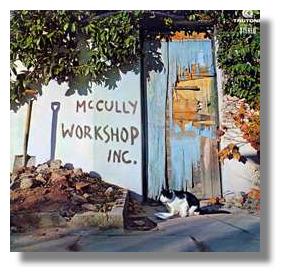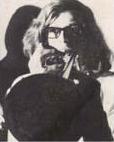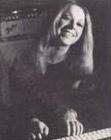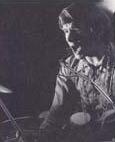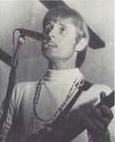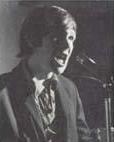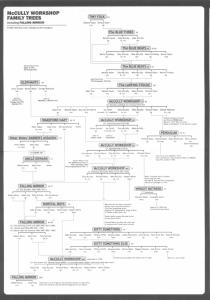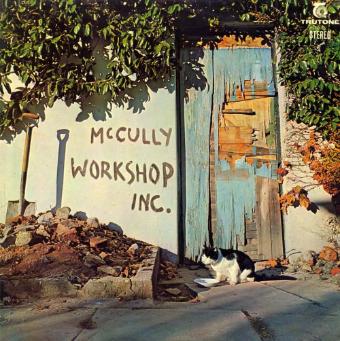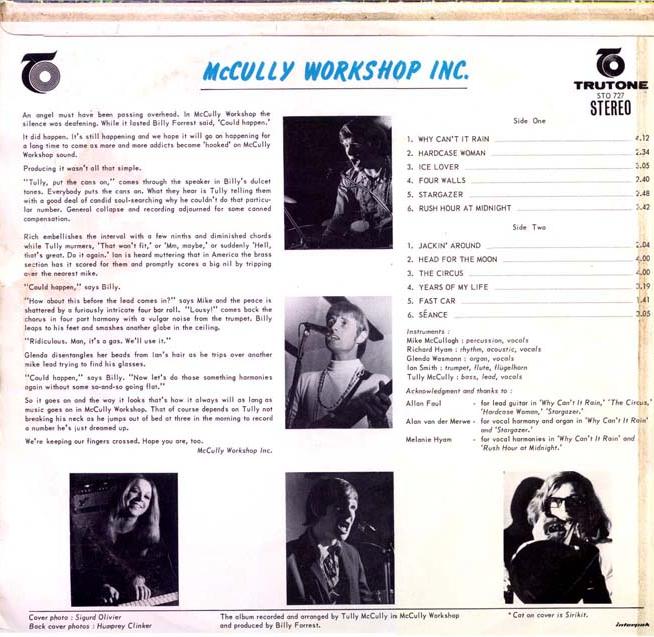Release information:
LP: June 1970, Trutone, STO 727
CD: February 2003, Merry-Go-Round Records,
a division of Beatball Music (Korea), BMRC-0001
CD: October 2009, Fresh Music, freshcd167
Tracks:
- Why Can't It Rain [4.12]
- Hardcase Woman [2.34]
- Ice Lover [3.05]
- Four Walls [2.40]
- Stargazer [2.48]
- Rush Hour At Midnight [3.42]
- Jackin' Around [2.04]
- Head For The Moon [4.00]
- The Circus [4.00]
- Years Of My Life [3.19]
- Fast Car [3.41]
- Sťance [3.05]
Musicians:
- Tully McCully: Vocals, bass, guitar
- Mike McCully: Vocals, drums
- Richard Hyam: Rhythm and acoustic guitars, vocals
- Glenda Wassman: Organ, vocals
- Ian Smith: Trumpet, flute, flugelhorn
Additional musicians:
Sleeve notes from 2009 Fresh Music re-issue:
“Of all the albums we’ve heard from South Africa this one is topscore. What a beautiful masterpiece. Pepper-influenced underground music with great songs, lovely vocals, strong harmonies, great distorted guitarwork.” — review on Psychedelic-Music.com website.
The McCullagh brothers, Tully (born Terence on 31st May 1953) and Mike (born Michael on 7th April 1947), have been an integral part of the South African music scene for five decades now.
In 1965 they started as a folk-rock trio with Richard Hyam and called themselves the Blue Three. Richard had been in a folk duo, Tiny Folk, with his sister Melanie. After a few personnel- and name-changes, like The Blue Beats and Larfing Stocke, the line-up settled down (for a while) in 1969.
“I had my own studio in the garage since I was 12” remembers Tully. It was a single garage in the garden of their home in Plumstead, in the Southern Suburbs of Cape Town. The brothers’ father, radio personality Michael Drin (his stage name), painted the name “McCully Workshop, Inc.” on the garage wall. “McCully” was an easier-to-spell version of McCullagh and the “Inc.” was a tongue-in-cheek addition.
A photo of the garage was used as the album cover. The photo was taken by Sigurd Olivier from the Argus newspaper. The cat’s name was Sirikit.
“We had been playing music for 6 years” remembers Mike McCullagh. “In 1969 I was 22 and Tully was 16, along with Richard Hyam, his sister Melanie and Allan Faull the group started.”
“We all wrote our own songs”, continues Mike, “and we just took the best ones for the album. Tully wrote ‘Why Can’t It Rain’ in the middle of the night and this became a hit single putting McCully Workshop on the charts for the first time.” This song went to number 12 on the Springbok Radio charts in July 1970 and also reached number 13 on the LM Radio charts.
“Why Can’t It Rain” drew the attention of the Gallo label, and they said they wanted an album. McCully Workshop signed probably the first independent licencing deal with a major label in South Africa.
Billy Forrest (born William Boardman in Kimberley in 1940) was the “top guy” at the time and was appointed as producer. He had recently had chart success with The Staccatos ‘Cry To Me’ and many others including The Dream Merchants and Quentin E Klopjaeger (one of his many pseudonyms).
Tully remembers Forrest’s catchphrase at the time was “could happen”.
The “Inc.” album shows a variety of styles and influences including The Beatles, Frank Zappa and Pink Floyd. “’Sgt Pepper’ was very important, as were the pop charts at the time”, recalls Tully.
Another big influence, according to Tully, was The Moody Blues ‘Threshold Of A Dream’ which was released in April 1969. Echoes of Graeme Edge’s poems can be heard in Mike McCully’s spoken words during the moonlanding-inspired ‘Head For The Moon’.
Alan van Der Merwe was a music teacher friend of Mike’s and was responsible for the vocal harmony arrangements. Tully cites South African band ‘The Sandpipers’ as an inspiration. This folk quartet, which consisted of two girls and two guys, and not be confused with the US folk trio, released an album titled ‘A Bird in Hand’ in 1967.
When asked to name his favourite song on the ‘Inc.’ album besides ‘Why Can’t It Rain’, Tully says without hesitation, ‘The Circus’. This song is an uptempo psychedelic pop-rocker with strong vocal harmonies, distorted guitar sounds from Allan Faull and great flute playing from Ian Smith.
The sessions were done, but another song was needed to complete the album, so a studio jam called ‘Jackin’ Around’ was added. Great organ sounds from Glenda Wassman, and a drum solo play-out from Mike McCully.
Glenda Wassman later married Richard, and they formed the pop band Pendulum and had a big hit with ‘Take My Heart’ in 1976. Glenda then went on to major success worldwide with the all-girl group, Clout, who had a huge hit with ‘Substitute’ which went to number 2 in the UK in 1978.
Allan Faull formed Falling Mirror in the late 70’s with his cousin Nielen Mirror (nee Marais).
Asked about an interesting studio story, Tully remembers feeling a few tremors and stuff falling off the walls one day during recording. “Everybody got a fright and rushed outside”, says Tully, “we thought it was a passing train.” Turned out to be the Tulbagh earthquake of 29th September 1969.
McCully Workshop, with the McCullagh brothers always at the core, have released a number of albums over the years and of course are best known for their big hit ‘Buccaneer’ from 1977.
40 years after those first recording sessions in late 1969, Tully is still involved in recording and runs his successful Spaced-Out Sounds Studio in Cape Town. Mike regularly packs out concert halls with his various nostalgic revue shows including ‘Sixty Something’, ‘Station 70′, ‘Music Of The Millennium’, ‘Country Classics’ and many, many others.
McCully Workshop still perform live on occasion and their first hit ‘Why Can’t It Rain’ is almost always included in the setlist.
The legends of South African pop and rock live on…
Brian Currin
Cape Town, September 2009
Sleeve notes for 2003 Korean re-issue:
The Psychedelic-Music.com Website describes McCully Workshop's first album like this: "Of all the albums we've heard from South Africa this one is topscore. What a beautiful masterpiece. Pepper-influenced Underground music with great songs, lovely vocals, strong harmonies, great distorted guitarwork."
Since 1965, the McCullagh brothers, Tully (born Terence on 31st May 1953) and Mike (born Michael on 7th April 1947), have become an integral part of the South African pop and rock scene.
"My brother [Mike] who plays drums and myself would play around and record ourselves in the lounge, I was about nine at the time. We recorded a track called 'Swinging Time' with some other friends when I was thirteen and sent it to a record company. The track didn't get anywhere but it was quite interesting. We grew a bit more and when I was sixteen (and Mike 22) we started a band called McCully Workshop and a whole string of other bands and I started a garage studio." – Tully McCully
McCully Workshop have had many line-up changes over the years, but the brothers have always surrounded themselves with superb musicians.
In 1965 they started as a folk-rock trio with Richard Hyam and called themselves the Blue Three. Richard had been in a folk duo, Tiny Folk, with his sister Melanie.
After a few personnel- and name-changes, like The Blue Beats and Larfing Stocke, the line-up settled down (for a while) in 1969 and they called themselves the McCully Workshop because they used to rehearse in Mrs McCullagh's garage.
Glenda Wassman later married Richard, and they formed the pop band Pendulum and had a big hit with 'Take My Heart' in 1976. Glenda then went on to major success with the all-girl group, Clout, who had a huge hit with 'Substitute' which went to #2 in the UK in 1978.
'McCully Workshop Inc' was produced by the great South African singer and producer Billy Forrest. The cover photo was taken by Sigurd Olivier and the cat's name was Sirikit.
'McCully Workshop Inc' was released in June 1970 and included the epic and powerful 'Why Can't It Rain' which went to #12 on the Springbok Radio charts in July 1970.
The album shows a variety of styles and influences including The Beatles, Frank Zappa and Pink Floyd.
McCully Workshop also played on country-pop singer Jody Wayne's 'The Wedding' in 1970 which hit #1 for 3 weeks on the Springbok Radio charts.
The follow-up to 'Inc' was an album titled 'Genesis' released in 1971. It was a concept album based on the book of Genesis from the Bible and included a number of long tracks with sub-sections, typical of other prog-rock albums of the time.
Crocodile Harris (real name Robin Graham, from Cape Town), recorded the brilliant haunting pop classic 'Miss Eva Goodnight' (Springbok #5, April 1974) which was written by Mike & Tully and featured the musicianship of all the then current McCully Workshop members.
'Ages' was released in 1975 and reflected musical styles from different ages of music and various influences could be heard: Uriah Heep, The Beatles, The Kinks and The Beach Boys, for example.
Their 4th album, 'Workshop Revisited', released in 1977 shot them to prominence when it introduced South African fans to hits like 'Buccaneer' and 'Chinese Junkman'. The album also saw Mike McCully winning the 1978 'Songwriter Of The Year' award.
They used to play in the late 70s at the Canterbury Inn in the Fairmead Hotel in Cape Town and wonderful renditions of classic rock songs could be heard on a Sunday night. Chicago's 'I'm A Man' (with a lo-o-ong percussion solo), Barry Ryan's 'Eloise', Grand Funk's (or Traffic's) 'Feeling Alright' and of course their own brilliant 1977 hit single 'Buccaneer' could all be heard; of course no dancing was allowed on a Sunday in those dark days, so the audience had to just sit and listen... and listen they did.
In 1998 the line-up from the late 70s reformed and re-recorded the old McCully Workshop classics and hits as well as 6 new songs and released the album 'Buccaneer'. 'Why Can't It Rain' also received a make-over losing none of its power and gaining an even stronger production.
In 2002 Tully is still running his successful Spaced-Out Sounds Studio in Cape Town and Mike regularly packs out concert halls with his nostalgic revue shows 'Sixty Something' and 'Music Of The Millennium'.
McCully Workshop is a band that deserves to be listened to, over and over again.
Thanks to:
Tully McCully, Mike McCully, Piet Obermeyer, Michelle Longman, Stephen 'Sugar' Segerman, John Samson, Kurt Shoemaker, Andrew King.
Brian Currin, Cape Town, South Africa, November 2002
Original sleeve notes from album back cover:
(
Scan of original back cover)
An angel must have been passing overhead. In McCully Workshop the silence was deafening. While it lasted Bill Forrest said, "Could happen."
It did happen. It's still happening and we hope it will go on happening for a long time to come as more addicts become 'hooked' on McCully Workshop sound.
Producing it wasn't all that simple.
"Tully, put the cans on," comes through the speaker in Billy's dulcet tones. Everybody puts the cans on. What they hear is Tully telling them with a good deal of candid soul-searching why he couldn't do that particular number. General collapse and recording adjourned for some canned compensation.
Rich embellishes the interval with a few ninths and diminished chords while Tully murmurs, "That won't fit," or Mm, maybe," or suddenly "Hell, that's great. Do it again." Ian is heard muttering that in America the brass section has it scored for them and promptly scores a big nil by tripping over the nearest mike.
"Could happen," says Billy.
"How about this before the lead comes in?" says Mike and the peace is shattered by a furiously intricate four bar roll. "Lousy!" comes back the chorus in four party harmony with a vulgar noise from the trumpet. Billy leaps to his feet and smashes another globe in the ceiling.
"Ridiculous. Man, it's a gas. We'll use it."
Track-by-track analysisPiet Obermeyer, November 2002
01)
'Why Can't It Rain'
Listening to this song makes me realize how much talent McCully Workshop
had. Even after all these years, it sounds as fresh as the day
it was recorded. 'Why Can't It Rain' was very popular in South Africa when
it was first released and made #12 on the Springbok Radio Charts. It is a pity that Tully always refused to do a live version at the Fairmead Hotel!
02)
'Hardcase Woman'
Interesting guitar work by Allan with a nice bass riff from Tully.
03)
'Ice Lovers'
Nice song with a strong melody. Ian's flute complements the song
very well. The "feel" of this song is typical of the 1970 era with
influences from many contemporary artists.
04)
'Four Walls'
Features Ian Smith on trumpet. Not as strong as some of the other
songs on the album, but easy to listen to.
05)
'Stargazer'
A very interesting song with a strong melody and some good
guitar work from Allan and organ backing from Glenda.
06)
'Rush Hour At Midnight'
The first impression I get when listening to this song is
that it escaped from the musical 'Hair'. Nice vocal harmonies
and a good song overall.
07)
'Jackin' Around'
The opening song on the second side of the original album. The
title of the song says it all. Mike doing his thing on the drum kit
towards the end of the track.
08)
'Head For The Moon'
I also feel like departing for the moon somedays. A sweet song
with a pleasant melody and one of my favorites on the album. The
trumpet blends in well with the rest of the band. Looks like Tully started practicing to sing 'Blues in C Minor' (from 'Ages' album) if you listen to the "announcement" at the start of this song.
09)
'The Circus'
Something different although not one of my favorites on the album. Nice vocal harmonies.
10)
'Years Of My Life'
Starting with a serious church organ, this track unfolds to a refreshing
ballad with a cool melody. Sounds like early Byrds, but still distinctly McCully Workshop.
11)
'Fast Car'
The opening riffs of this song reminds me of the music they used play
at the Boswell Wilkie circus. Not one of my favorite songs, but obviously
a filler on the album.
12)
'Sťance'
The other side of life? A serious song with quiet vocals from Tully, nicely
complemented with flute and guitar.

